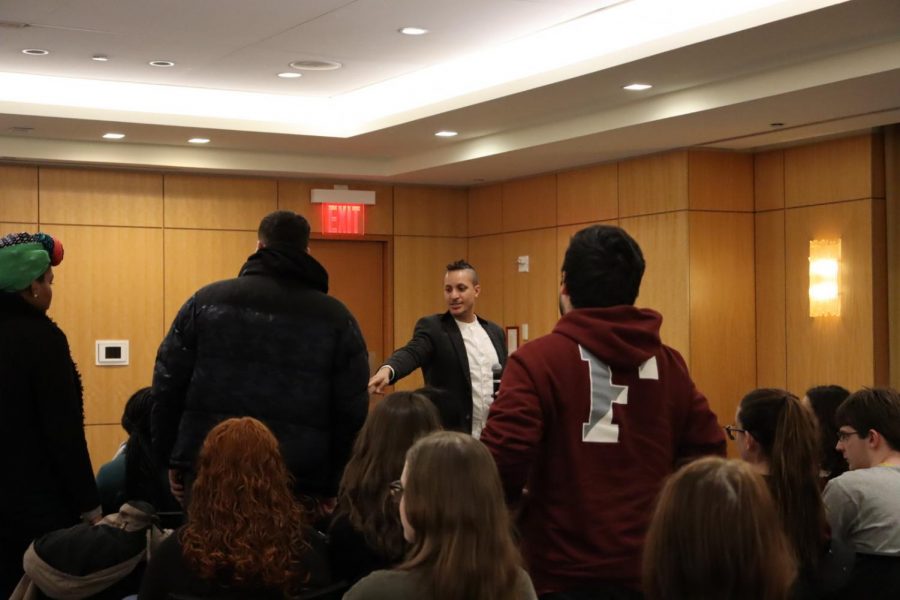Akeem Browder Discusses Broken System of Mass Incaceration
On Friday, Feb. 28, students and faculty were able to view the first part of “Time: The Kalief Browder Story,” a 2017 six-part documentary that gives a background of the criminal justice system through the lens of Kalief Browder. Akeem Browder, Kalief’s brother, attended the event and facilitated discussions about law, justice and humanity.
Kalief Browder was a teenager who grew up on 181st Street and Prospect Avenue, right outside the Bronx Zoo. In 2010, at the age of 16, Browder was arrested for allegedly stealing a backpack on Arthur Avenue. What ensued over the next three years included being denied bail and living two out of three years on Rikers Island in solitary confinement. Kalief. After he was released, he struggled with mental health, and took his own life in 2013.
In honor of Kalief’s life, his older brother Akeem has become a full-time activist to help tell his story. He has been travelling around the country and having conversations with students similar to the one he had at Fordham.
“The system is not broken —it’s working exactly the way that it’s supposed to,” he said, stating that the system is mechanized against poor people, namely blacks and Latinos.
Browder gave a brief history of the bail system in America, citing bounty hunters collecting money for the capture of runaway slaves. Browder emphasized the importance of understanding the country’s origins and their significance now during Black History Month.
Browder said a huge part of what he does through the Kalief Browder Foundation is empowering youth through education. He said coming to teach at middle schools, high schools and colleges allows students to understand the law, the lobbying process, how to write legislation and the importance of civic engagement.
“People in poor communities do not think that voting makes a difference because our suffering is ongoing whether we vote or not,” he said. “It does make a difference … we just have to teach.”
Browder said he is running for mayor in 2021 to help promote policies that do not demonize black and Latino communities. He said education and mental health have been priority issues for him over the years. He said he was successful in helping to pass a state bill that would give jail systems funding for education. Browder said he supports bringing those incarcerated to a human standpoint so that they are able to be productive members of society upon release.
Browder said he believes that living as a New Yorker is a difficult feat in itself, but the task is much harder for someone who is poor. He talked about the Bronx being a food desert, the poorest borough in New York City, and along with New York’s 15th Congressional District, having the lowest median household income in the nation. He said he sees the connections between food, education, mental health and general quality of life. To him, all of these factors combined can make or break someone’s life, like Kalief’s.
Juan Carlos Matos, assistant vice president of Student Affairs for Diversity and Inclusion, said the main takeaways of the event included understanding how mass incarceration disproportionately targets black and Latino communities, and the impact of solitary confinement on mental health. Equally significant, he said, is Fordham’s relationship to these issues.
“With Fordham being nestled in the Bronx, continued conversations about issues that impact black and brown communities, in this case mass incarceration, deserve continued exploration,” he said.
Organizers of the event including Hira Hassan, FCRH ’20, spoke along the same lines.
“I hope students will begin to question and recognize the roles of power and privilege in their experience within Fordham as a gated community versus the lived experience of those outside the gates,” she said.
Hassan sits on the Office of Multicultural Affairs’ Black History Month committee. She was responsible for bringing Akeem to Fordham after watching the docuseries and said she wanted to open the eyes of fellow Fordham students. Although she said the story is enlightening, she also said it feels bittersweet to have the knowledge of what Kalief went through.
“Akeem emphasizes that until people start taking action, we’re insane to expect a change,” she said.
Browder wanted students to reflect on their own lives. For him, Kalief’s story is a loss of childhood, from the time of his arrest at 16 to the end of his life at 22.
“What could you be missing in your life and how could it impact you?” he asked. He said he hopes with this in mind, students will be willing to take action on issues that surround them.










































































































































































































